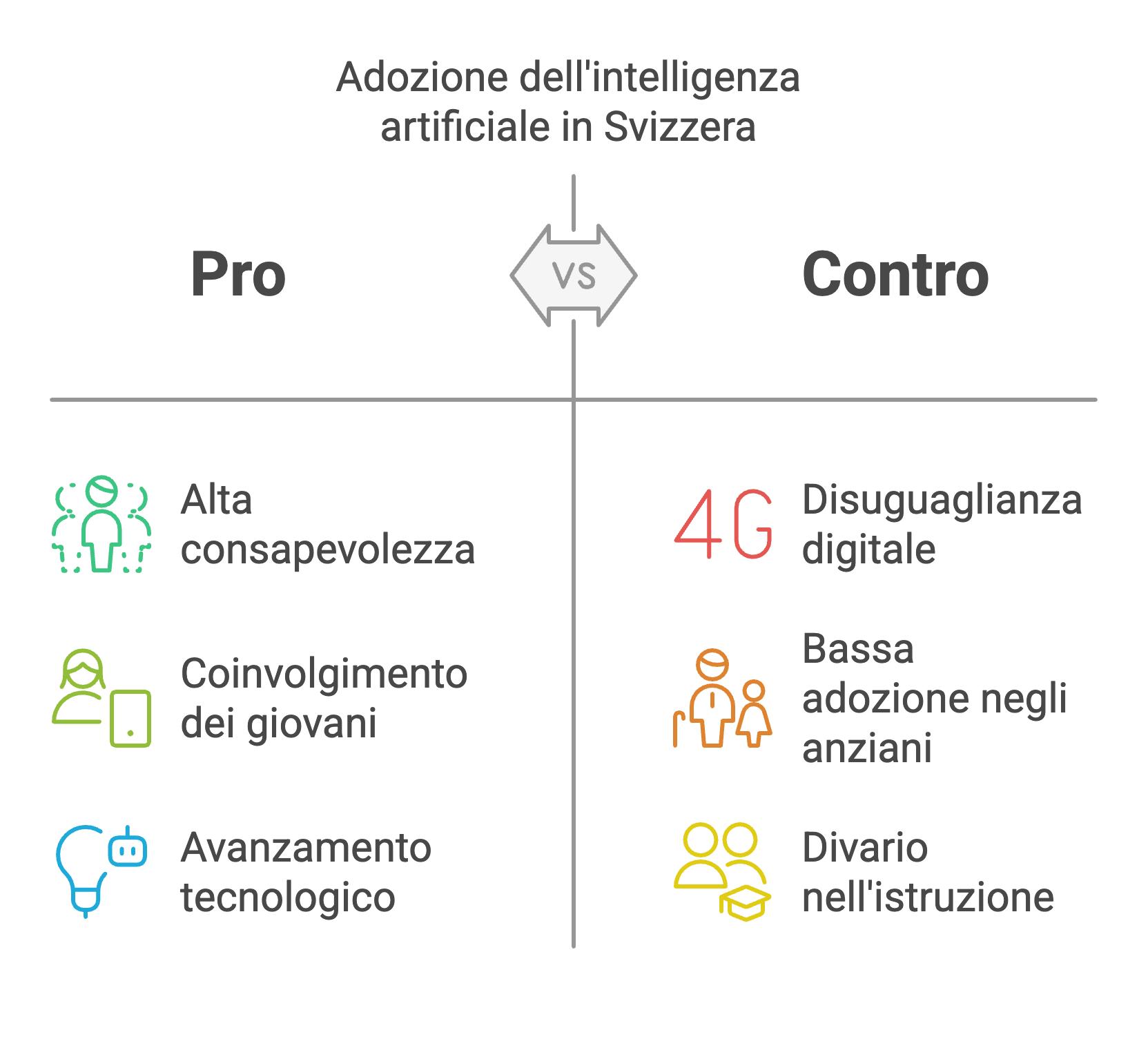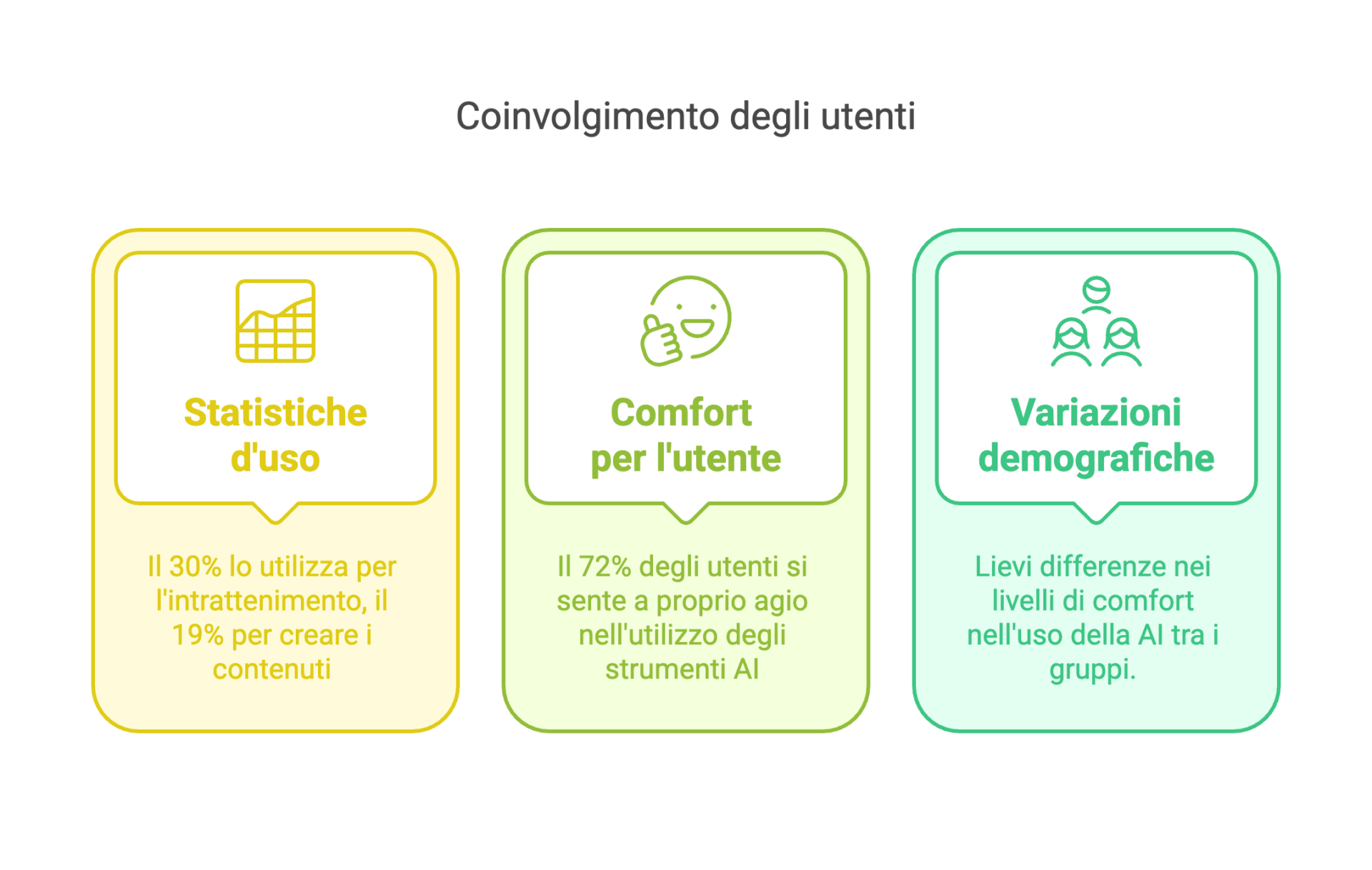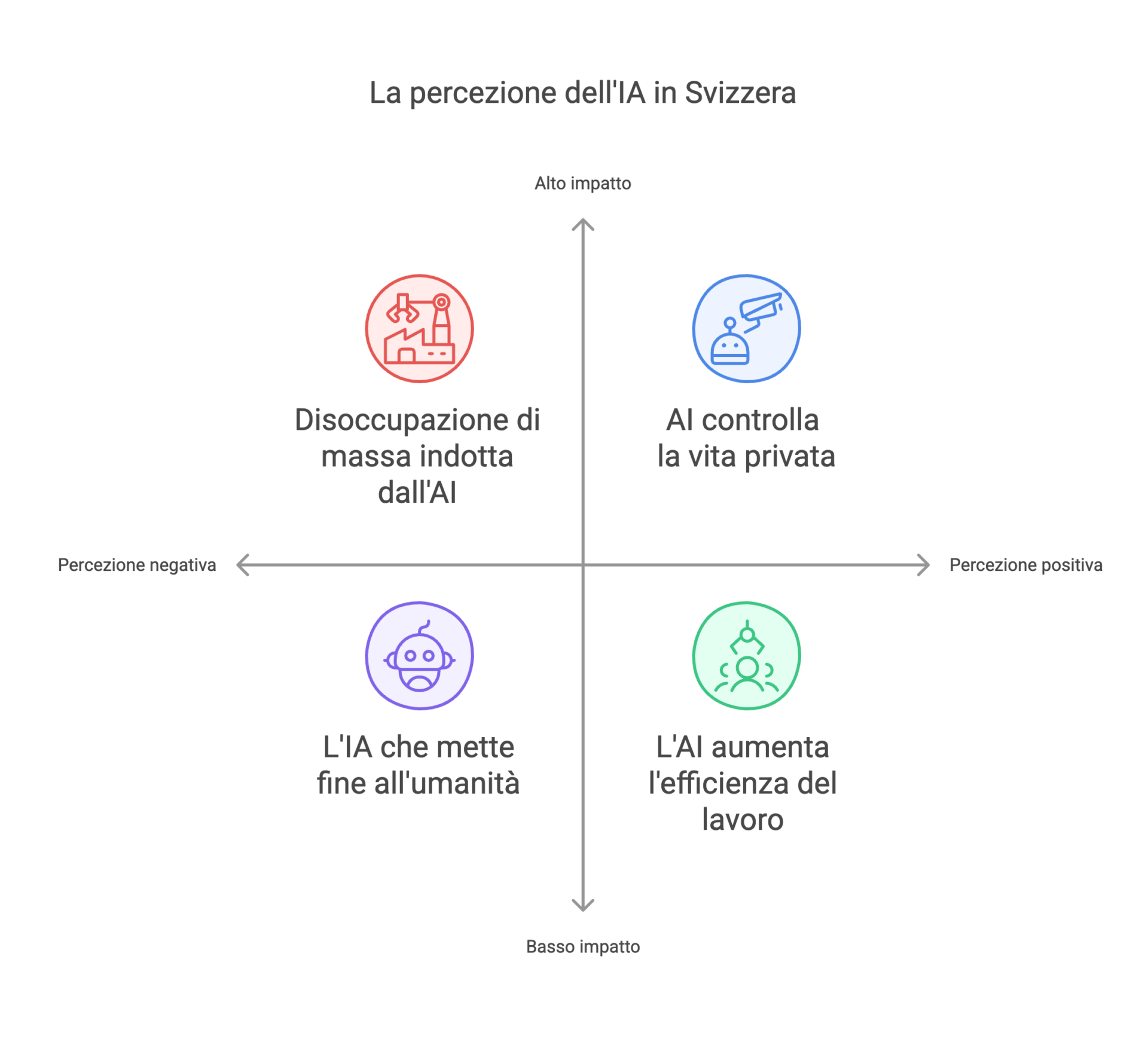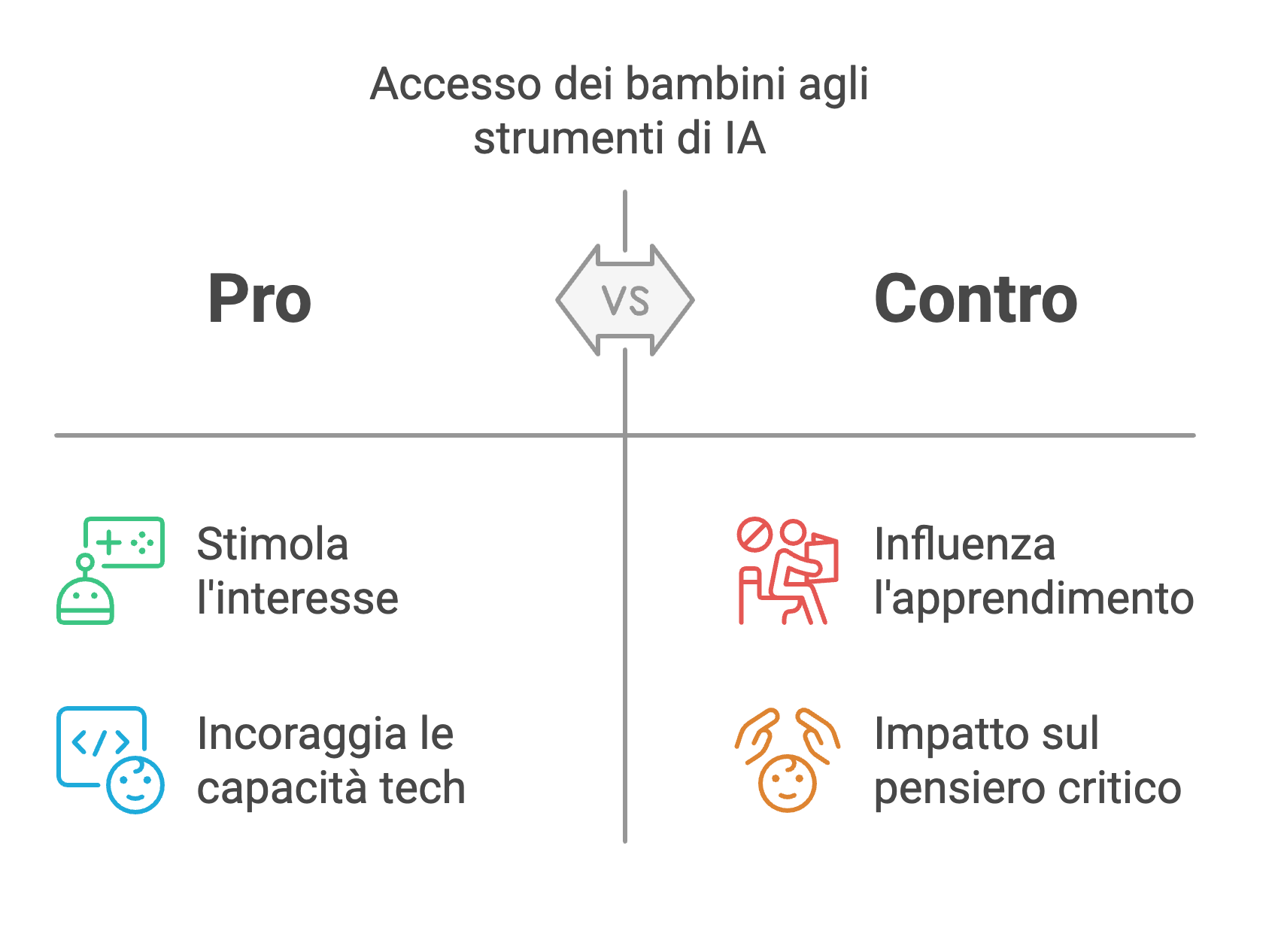L’avvento degli strumenti di intelligenza artificiale generativa come ChatGPT ha segnato una svolta nell’interazione tra tecnologia e società, con la Svizzera che emerge come un caso emblematico di rapida diffusione e dibattito critico.
Un paio d’anni dopo il lancio pubblico di Chat GTP, il 98% degli utenti internet elvetici ne è a conoscenza, e il 54% li ha utilizzati almeno una volta. I giovani tra i 16 e i 29 anni rappresentano la fascia più attiva, con il 93% di utilizzatori, mentre tra gli over 70 la penetrazione scende al 24%. Questi dati, raccolti dall’Università di Zurigo in collaborazione con il World Internet Project, disegnano un panorama in cui l’età e il livello di istruzione giocano un ruolo decisivo nell’adozione tecnologica, ampliando le disuguaglianze digitali preesistenti.
Conoscenza e diffusione degli strumenti di AI
La quasi totalità della popolazione svizzera connessa a internet (98%) ha sentito parlare di strumenti di intelligenza artificiale generativa, un dato in netta crescita rispetto al 79% registrato nel 2023. Tuttavia, solo il 29% dichiara di possedere una conoscenza approfondita, con differenze marcate tra le generazioni: il 61% dei giovani under 30 si considera esperto, contro appena il 7% degli over 70. Questo divario riflette un pattern ricorrente nell’adozione tecnologica, dove l’età funge da discriminante primaria.
L’istruzione amplifica ulteriormente le discrepanze. Tra i laureati, il 41% afferma di padroneggiare questi strumenti, una percentuale doppia rispetto a chi possiede un titolo di studio medio-basso[1]. Questa polarizzazione suggerisce che l’AI non solo riflette le disuguaglianze esistenti, ma rischia di acuirle, creando una frattura tra chi ha gli strumenti culturali per sfruttarla e chi ne resta escluso.

Modelli d’uso: tra sperimentazione e integrazione
Metà degli utenti svizzeri (54%) ha sperimentato strumenti di AI, con un incremento del 50% rispetto al 2023. L’utilizzo frequente (19%) rimane però limitato, segno che per molti si tratta ancora di una tecnologia in fase di esplorazione. Il 54% degli utilizzatori ammette di averli testati principalmente “per vedere quanto sono efficaci”, mentre il 38% li impiega per semplificare testi complessi, risolvere problemi lavorativi o apprendere nuove competenze.
L’integrazione nell’ambito educativo e professionale mostra potenzialità inespresse. Il 30% li utilizza per intrattenimento, e il 19% per generare contenuti che tradizionalmente richiederebbero sforzo umano, come relazioni o ricerche. Nonostante la novità degli strumenti, il 72% degli utenti si dichiara “abbastanza” o “molto” a proprio agio nel loro utilizzo, con piccole variazioni tra gruppi demografici. Questa familiarità, seppur preliminare, indica una transizione verso forme di collaborazione uomo-macchina sempre più strutturate.

Il paradosso dei non utenti: scetticismo e timori
Il 46% della popolazione online svizzera non ha mai utilizzato strumenti di AI, e il 77% di questi non intende farlo nei prossimi sei mesi. Le ragioni principali risiedono nella sfiducia verso l’affidabilità delle informazioni generate (valutazione media 4.01 su 5) e nella percezione di scarsa rilevanza nella vita quotidiana (3.93). Curiosamente, le preoccupazioni per la privacy (3.84) superano la semplice mancanza di interesse (3.75), rivelando un undercurrent di diffidenza verso le implicazioni etiche di queste tecnologie.
I non utenti con bassa istruzione esprimono un scetticismo più marcato, legato alla convinzione che l’AI non porti benefici tangibili (3.18 vs 3.33 dei mediamente istruiti). Questo dato sottolinea come l’alfabetizzazione digitale giochi un ruolo cruciale non solo nell’adozione, ma anche nella capacità di coglierne le potenzialità.

Atteggiamenti pubblici: tra ottimismo e cautele
Il 54% degli svizzeri ritiene che l’AI possa essere utilizzata per monitorare la vita privata (3.86 su 5), mentre il 48% ne riconosce l’utilità nell’aumentare l’efficienza lavorativa (3.42). Le paure di disoccupazione di massa (3.08) e l’idea che l’AI possa “porre fine all’umanità” (2.46) restano minoritarie, ma rivelano una stratificazione generazionale: i giovani under 30 sono più propensi a vedere impatti positivi (3.80 vs 3.18 degli over 40).
Il dibattito sull’accesso dei minori agli strumenti di AI polarizza l’opinione pubblica: il 54% lo vieterebbe, temendo ripercussioni sull’apprendimento e il pensiero critico, mentre il 33% lo permetterebbe per stimolare l’interesse tecnologico. Qui le differenze di genere sono nette: il 64% delle donne si oppone, contro il 44% degli uomini.
La questione regolatoria: un territorio inesplorato
Un terzo della popolazione (34%) crede nella possibilità di regolamentare l’AI, mentre il 22% la considera ingestibile. Il 24% invoca prudenza, sostenendo che sia troppo presto per definire parametri. I giovani mostrano maggiore fiducia nelle istituzioni: il 41% degli under 30 vede possibile una governance, contro il 26% degli over 70.
Tra chi nega la regolamentazione, prevale la convinzione che attori malevoli (4.60 su 5) e divergenze internazionali (4.33) la rendano impraticabile. Questo scetticismo riflette una sfiducia sistemica verso meccanismi di controllo transnazionali, accentuata dalla velocità dello sviluppo tecnologico.
Implicazioni per il futuro digitale elvetico
La Svizzera si trova a un bivio. Da un lato, l’alto tasso di adozione tra giovani e istruiti promette di accelerare l’innovazione in settori chiave come formazione, sanità e finanza. Dall’altro, il rischio di acuire le disuguaglianze digitali richiede politiche mirate: programmi di alfabetizzazione per anziani, linee guida etiche nell’uso scolastico dell’AI, e partnership pubblico-private per colmare il divario educativo.
L’esperienza svizzera offre spunti cruciali per altri Paesi: l’equilibrio tra entusiasmo tecnologico e cautela sociale, tra libertà d’innovazione e tutela dei diritti, potrebbe definire modelli replicabili in contesti con simili caratteristiche socioeconomiche. La sfida sarà tradurre la consapevolezza diffusa in strumenti concreti per governare una transizione che, numeri alla mano, è già in atto.
Scarica report Università di Zurigo qui
In Ex Machina siamo sempre alla ricerca di nuove soluzioni da poter utilizzare nei nostri progetti per realizzare soluzioni personalizzare per aziende ed enti pubblici. Se vuoi scoprire di più sulle nostre soluzioni AI visita il nostro sito > https://exmachina.ch

